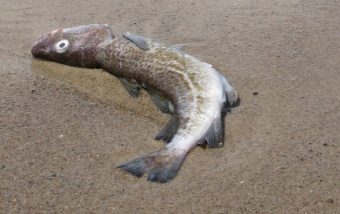EU – Baltic States, Legislation, Markets and Companies
International Internet Magazine. Baltic States news & analytics
Monday, 29.12.2025, 13:02
New report exposes how illegal discarding of Baltic fish fails EU citizens
 Print version
Print version |
|---|
The report urges EU Member States to immediately act on implementation of proven monitoring and enforcement programs in order to end illegal and wasteful discarding.
The report, titled Thrown Away: How Illegal Discarding in the Baltic Sea is Failing EU Fisheries and Citizens, published by campaign group Our Fish, finds EU government responses to the Landing Obligation have in some cases made discarding worse, while clear advice on effective tools to monitor and control the law is being ignored. This situation is failing the almost 900,000 EU citizens who actively supported a ban on discards during the reform of the Common Fisheries Policy.
"EU citizens expect national governments and EU authorities to uphold the laws they have signed up to - yet fisheries ministers are not keeping their end of the bargain," said Our Fish Programme Director Rebecca Hubbard. "If EU governments are serious about ending wasteful and illegal discarding, it is clear that they have to stop dodging responsibility, and put in place effective electronic monitoring and enforcement programs, only giving quota top-ups to fishing fleets who can prove that they comply with the law".
"By failing to properly implement the discard ban in the Baltic Sea, EU governments are jeopardising the sustainability of fish stocks, undermining scientific advice, and perpetuating a waste of valuable resources. Not only does this limit the economic prosperity of the fishing industry, it exposes the EU seafood supply chain to unprecedented levels of illegal behaviour", continued Hubbard.
"Retailers and customers throughout Europe may be shocked to find out that cod on their supermarket shelves is likely to be from a Baltic fishery that is illegally discarding", said Hubbard. "Retailers should insist that electronic monitoring is promptly implemented in order to ensure compliance in the supply chain. The problem of discards is particularly alarming in the case of Baltic cod, but not at all limited to these fisheries".
The Thrown Away report outlines how 90% of undersize Baltic cod is still being discarded - in 2016 alone, some 11.5 million Baltic Sea cod were discarded illegally. In 2018 and 2019, these illegal discard figures are set for another dramatic increase if monitoring and enforcement do not improve, as the first strong year class of western Baltic cod in over a decade joins the population.
Findings of the Thrown Away report also include:
● The reduction in Minimum Conservation Reference Size for eastern Baltic cod has resulted in a worsening of fishing selectivity, through the incentivising of commercialization of smaller size eastern cod, and has had no apparent effect on reducing discard rates.
● Many of the flexibilities provided for in the CFP Article 15 have yet to be used, while quota swaps to help deal with changes in landings of different species - which have been encouraged and predicted to increase by the European Commission - have instead decreased since 2014.
● The European Fisheries Control Agency and national control agencies have invested heavily in at-sea inspections with catch profiling (last-haul analysis) to assess the level of compliance with the LO, however, these techniques cannot be used by enforcement authorities to prosecute individual fishers for illegal discarding.
Recommendations for responsible authorities at national and EU level include:
· Initiate electronic monitoring programmes, starting with demersal mixed trawl fisheries, to improve data collection and compliance rates, and gather evidence of suspected violations;
· Allocate TAC adjustments to national fishing fleets that have high at-sea monitoring coverage or can demonstrate that they are complying with the LO; and
· Reallocate quota at a national level to those vessels that can demonstrate they are operating in compliance with the LO.
The Thrown Away report can be downloaded from our.fish/thrownaway2017








 «The Baltic Course» Is Sold and Stays in Business!
«The Baltic Course» Is Sold and Stays in Business!

